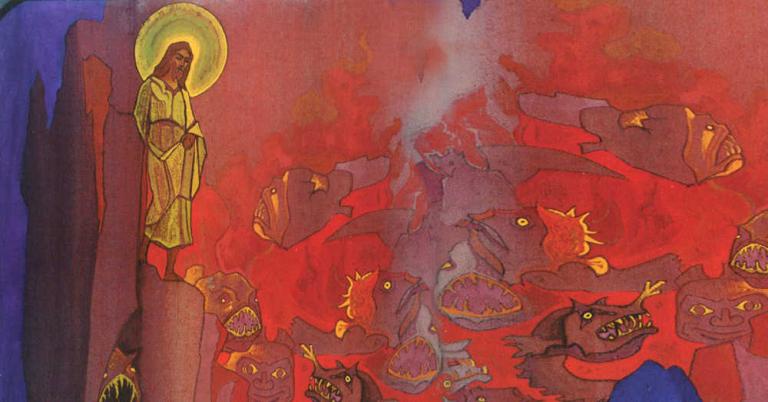Here is a topic for both Halloween and Reformation Day, both of which fall on this day, a way to bring them together: Reflections on Hell (a scary topic for All Hallows Eve, when the demons were thought to come out) and reflections on how Christ saves us from Hell (a joyous topic that is at the essence of the Reformation).
These thoughts were occasioned by long-time reader Tom Hering, who in his comment in Friday’s discussion about what reforms the church needs today said this:
Preaching about Hell has become rare, even in conservative churches. Of course, the prospect of eternal punishment makes everyone uncomfortable. And the topic is controversial, likely to put off people in our secular climate.
And yet, despite this neglect, it turns out that most people in our secular climate do believe in Hell. According to a Pew Study, 62% of American adults–nearly two-thirds–believe in Hell. Not only do 79% of Christians believe in eternal punishment, so do 28% of Americans who are “nothing in particular”!
And what they believe Hell to be is not simply a shadowy or symbolic condition, but actual eternal torment. As the Pew Study summarizes,
In the case of hell, the survey asked about five different traits. About half of all U.S. adults – the vast majority of the 62% who believe in hell – say that people in hell definitely or probably experience psychological suffering [53%], become aware of the suffering they created in the world [53%], experience physical suffering [51%], and are prevented from having a relationship with God [49%]. A slightly smaller share (44%) say they believe people in hell definitely or probably can meet Satan.
Though most Christians and even many non-Christians can accept the existence of Hell, I think the 21% of those in the Christian orbit who do not, do so for theological reasons. They reason that God is loving, He is just, and He is merciful, so that He could never condemn anyone eternally.
Such reasoning comes from a high view of God and emerges out of a pious and tender heart. And yet it is an example of what J. G. Hamann criticized in a different context in his London Writings. It is an attempt to approach God “through His attributes,” rather than through His self-revelation in the Word of God.
That is, we can draw out the characteristics of God. He is indeed loving, just and merciful. But He is not just a collection of characteristics that we can then set against each other. Hamann was concerned that the rationalist theologians of the Enlightenment were treating God as an abstraction, as a mere idea, rather than as a Person. Such descriptions of God–to which we could add other attributes such as being all-knowing, all-powerful, etc., etc.–are certainly valid extractions from Scripture, but descriptions of a person are not the same as the actual person, who will have many more facets than we can comprehend.
The issue isn’t speculating whether or not God is too good to create Hell. The issue is whether there is such a place. And if there is–and God’s revelation says that it is–it does not contradict the other things Scripture tells us about God, such as His goodness, even though we cannot get our minds around them all.
But we do not need to fear Hell. After His crucifixion, which atoned for the sins of the world, Christ descended into Hell, an act of victory over Satan, just as He has invaded the devil’s domain in our hearts to bring us rescue and salvation.
This good news that we are saved not by our own works but by the work of Christ on our behalf is the message of the Reformation and of Reformation Day.
28 For when we had been created by God the Father, and had received from Him all manner of good, the devil came and led us into disobedience, sin, death, and all evil, so that we fell under His wrath and displeasure and were doomed to eternal damnation, as we had merited and deserved. 29 There was no counsel, help, or comfort until this only and eternal Son of God in His unfathomable goodness had compassion upon our misery and wretchedness, and came from heaven to help us. 30 Those tyrants and jailers, then, are all expelled now, and in their place has come Jesus Christ, Lord of life, righteousness, every blessing, and salvation, and has delivered us poor lost men from the jaws of hell, has won us, made us free, and brought us again into the favor and grace of the Father, and has taken us as His own property under His shelter and protection, that He may govern us by His righteousness, wisdom, power, life, and blessedness.
–Luther, the Second Article of the Creed, Large Catechism
Illustration: “The Harrowing of Hell” (1933) by Nicholas Roerich, Public domain, via Wikimedia Commons













